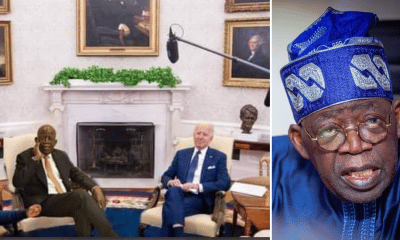Business
Binance Founder CZ Resigns As CEO Amid $4 Billion Settlement With U.S. Authorities

Changpeng “CZ” Zhao has resigned as CEO of Binance as part of a significant $4 billion settlement between the cryptocurrency exchange he established and various United States regulatory agencies.
On Tuesday, the announcement from Zhao and multiple regulatory agencies capped yearslong investigations by the Department of Justice and others into anti-money laundering violations and sanctions violations.
“I made mistakes, and I must take responsibility,” Zhao wrote in a post to X, the platform formerly known as Twitter. “This is best for our community, for Binance, and for myself.”
In a press statement, Binance said it would take responsibility for not having appropriate compliance controls. “When Binance first launched, it did not have compliance controls adequate for the company that it was quickly becoming, and it should have.“
Zhao’s departure as CEO, which Forbes first reported, will not be a complete separation from Binance. The company’s founder will remain its majority shareholder and a resource for “consultation on historical areas of the business,” the company said. It added that Binance executive Richard Teng would succeed Zhao as CEO, confirming Forbes’s earlier reporting.
As part of the settlement, Zhao appeared in federal court in Seattle on Tuesday afternoon and pleaded guilty to anti-money laundering and sanctions violations brought by the Department of Justice.
Additionally, Binance settled charges with the DOJ and Commodities Futures Trading Commission, the Department of Treasury’s Financial Crimes Enforcement Network (FinCEN) and the Office of Foreign Assets Control (OFAC), which will give the Treasury Department access to Binance’s books and records under the terms of a five-year monitorship.
“Because of the crimes committed, Binance became the largest cryptocurrency exchange in the world,” Merrick Garland, the US Attorney General, said during a press conference on Tuesday. “Binance has paid one of the largest corporate penalties in US history.“
The Treasury Department, in a statement, asserted that it had taken unprecedented action to enforce accountability on Binance for violations of U.S. anti-money laundering laws.
The department alleged that Binance had neglected to prevent and report suspicious transactions involving terrorists, specifically citing both Al Qaeda and ISIS.
The settlement comes with a $3.4 billion penalty to FinCEN and $968 million to OFAC, as well as compliance requirements and monitoring for a period of five years.
“Binance turned a blind eye to its legal obligations in the pursuit of profit. Its willful failures allowed money to flow to terrorists, cybercriminals, and child abusers through its platform,” Treasury Secretary Janet Yellen said during a press conference.
At the time of publication, the CFTC did not respond to requests for comment.
Earlier in June, the SEC had filed charges against Binance and its founder, Zhao, accusing them of running an unregistered exchange and misleading investors.
The charges also implicated the use of a Switzerland-based fund, Sigma Chain, owned by CZ, to artificially boost trading volume on Binance’s U.S. platform.
SEC Chair Gary Gensler stated, “Through thirteen charges, we allege that Zhao and Binance entities engaged in an extensive web of deception, conflicts of interest, lack of disclosure, and calculated evasion of the law.” The case remains ongoing, and the SEC declined to provide further comments.
Brian Armstrong, CEO and co-founder of Coinbase, a direct competitor of Binance in the U.S., regarded the announcement as “an opportunity to start a new chapter for this industry” in a post on X.
Armstrong, whose company has faced regulatory scrutiny from the SEC, expressed hope that the regulatory action against Binance would catalyze greater regulatory clarity for the industry.












